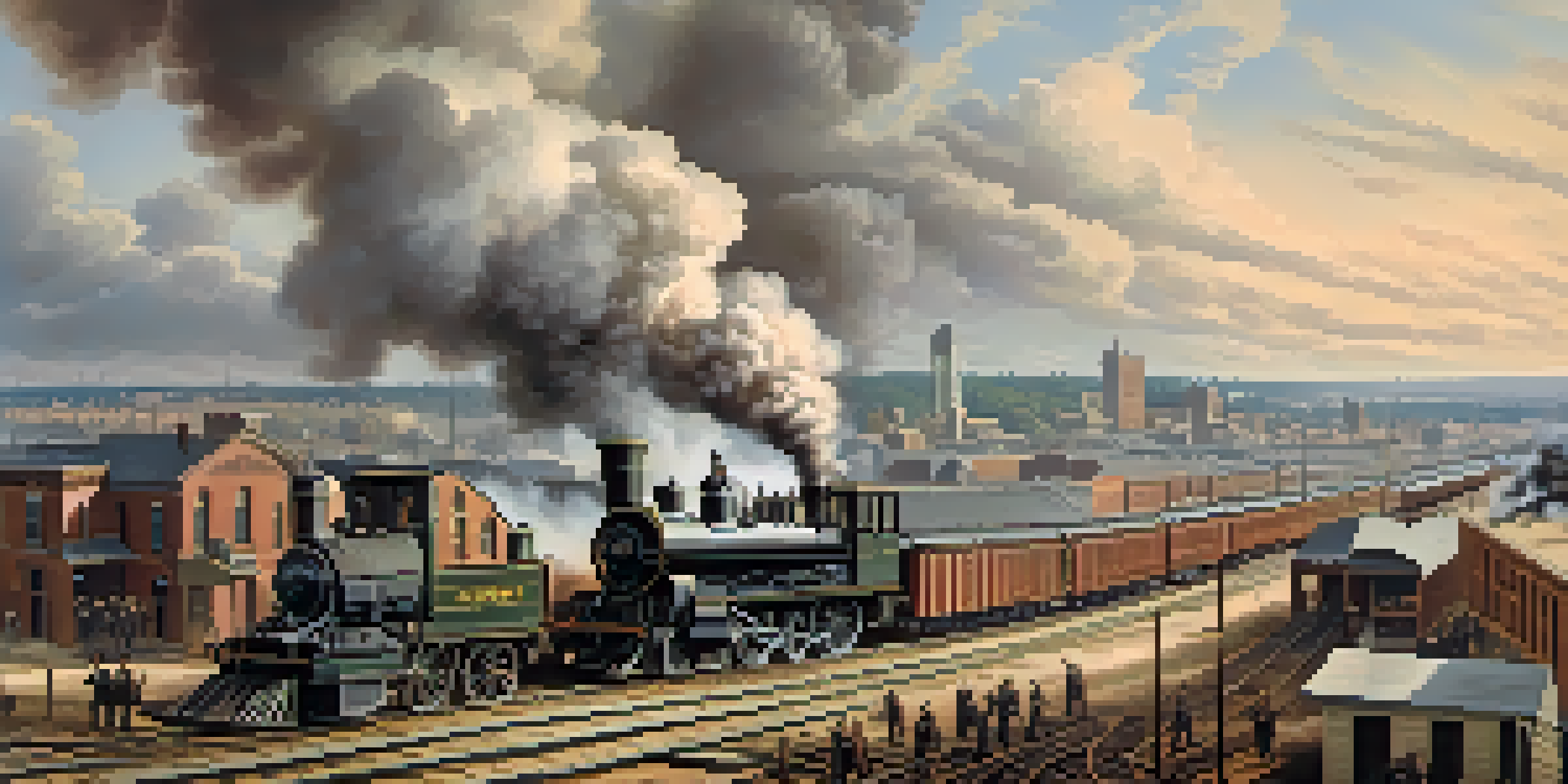Civil War Atlanta: A City Resilient Through Destruction

The Strategic Importance of Atlanta in the Civil War
During the Civil War, Atlanta was a vital transportation hub, connecting railroads that facilitated the movement of troops and supplies. Its strategic location made it a target for both the Confederate and Union armies, leading to intense battles and significant military actions. This city was not just a backdrop for the war; it was a focal point that influenced the outcome of various campaigns.
The past is never dead. It's not even past.
The railroads in Atlanta were crucial for the Confederacy, enabling them to transport goods and soldiers quickly. Control over this city meant control over the supply lines, which was essential for sustaining the war effort. As a result, Atlanta was often referred to as the 'Gateway to the South,' underscoring its importance in the conflict.
Because of its strategic significance, Atlanta became a battleground for several key military leaders. Their decisions, often made under pressure, would change the course of the war. This blend of military strategy and urban life set the stage for a dramatic transformation in the city.
The Destructive Path of General Sherman
In 1864, Union General William Tecumseh Sherman launched his infamous 'March to the Sea,' with Atlanta as his primary target. Sherman's campaign aimed to break the will of the South, and his tactics involved not just military engagement but also psychological warfare. The destruction of Atlanta was a calculated move to cripple Confederate morale and resources.

Sherman's forces captured Atlanta in September 1864, leading to widespread destruction across the city. Buildings were burned, homes were looted, and the infrastructure crumbled under the weight of war. This brutal assault left a scar on Atlanta's landscape and its people, as many families were displaced and livelihoods destroyed.
Atlanta's Strategic Role in the War
Atlanta's position as a transportation hub made it a key target for both Confederate and Union armies during the Civil War.
Despite the devastation, Sherman's actions inadvertently set the stage for Atlanta's resilience. The city, though battered, began to rally its citizens to rebuild and restore what had been lost. This spirit of resilience would become a defining characteristic of Atlanta in the years following the war.
Life in Atlanta During the Civil War
While the battles raged around them, daily life for Atlantans continued in a precarious balance. Families faced food shortages, inflation, and the constant threat of violence, yet they found ways to adapt. Community bonds strengthened as neighbors relied on one another for support during these dark times.
In the midst of chaos, there is also opportunity.
Women played a pivotal role during the war, stepping into jobs traditionally held by men who were away fighting. They managed households, worked in factories, and even served as nurses on the front lines. This shift not only challenged gender norms but also empowered women in ways that would have lasting effects beyond the war.
Children, too, experienced the war's impact, as many were forced to grow up quickly. Their education was disrupted, and they often witnessed the harsh realities of conflict. Yet, through resilience and creativity, they found ways to cope, illustrating the spirit of Atlanta's populace amid chaos.
Reconstruction: The Phoenix Rising from the Ashes
After the war ended in 1865, Atlanta faced the daunting task of rebuilding. The once-thriving city had suffered immense destruction, and its residents were determined to restore their homeland. The Reconstruction era brought both challenges and opportunities as they sought to redefine their identity.
The federal government implemented policies to help rebuild the South, but local leaders and citizens were essential in the recovery process. They worked tirelessly to restore infrastructure, including railroads, schools, and homes. This collective effort laid the groundwork for a new Atlanta that would emerge from the ashes.
Sherman's March and Atlanta's Resilience
Although General Sherman's campaign led to widespread destruction in Atlanta, it sparked a powerful spirit of resilience among its citizens.
Atlanta's resilience during Reconstruction set a precedent for future generations. The city began to attract new businesses and industries, fostering economic growth. This transformation was not just about physical rebuilding but also about healing and uniting a community that had been deeply divided.
Cultural Impact of the Civil War on Atlanta
The Civil War left an indelible mark on Atlanta's cultural landscape. The experiences of war shaped the stories, arts, and traditions that emerged in the years following the conflict. The struggle for identity and recovery became central themes in the narratives told through literature, music, and visual arts.
As Atlanta rebuilt, it also embraced its history, honoring the sacrifices of those who fought. Memorials and monuments began to appear, serving as reminders of both the loss and the resilience of the city. These cultural landmarks became gathering places for reflection and celebration, fostering a sense of community.
Moreover, the war prompted a reevaluation of values and perspectives within the city. Discussions around race, equality, and rights became more prominent, bridging the past with the future. This cultural evolution was vital in shaping the identity of Atlanta as a city that learned from its struggles and sought to move forward.
Atlanta's Resilience: Lessons for the Future
The story of Atlanta during the Civil War is one of resilience and determination. As the city faced destruction, its people demonstrated an incredible ability to adapt and rebuild. This narrative serves as a powerful reminder that even in the darkest times, communities can come together to forge a brighter future.
Atlanta's experience teaches us about the importance of unity and collaboration. Challenges can be daunting, but the collective efforts of individuals can lead to remarkable transformations. By supporting one another, cities can emerge stronger and more connected, just as Atlanta did.
Cultural Impact Post-Civil War
The Civil War profoundly shaped Atlanta's cultural landscape, influencing its narratives, arts, and community values in the years that followed.
Today, as we reflect on Atlanta's past, we can draw inspiration from its journey. The spirit of resilience that defined the city during the Civil War continues to resonate, reminding us that adversity can lead to growth and renewal. This legacy shapes not just Atlanta, but all communities striving to overcome their own challenges.
Atlanta Today: A City Forged by History
Modern Atlanta stands as a testament to its tumultuous past, embodying a unique blend of history and progress. The scars of the Civil War are still visible, but they have been transformed into symbols of resilience. The city has become a vibrant cultural and economic hub, attracting people from all walks of life.
Historical sites and museums serve as reminders of the Civil War era, allowing residents and visitors to connect with the past. These places not only honor those who lived through the conflict but also educate future generations about the importance of understanding history. Atlanta's commitment to remembering its past is evident in its active engagement with its history.

As Atlanta continues to grow and evolve, it remains rooted in the lessons learned from its struggles. The city’s ability to adapt and thrive in the face of adversity is a powerful narrative that fuels its future. The resilience of Atlanta is not just a historical anecdote; it is an ongoing story of a city that has risen from the ashes to embrace its potential.